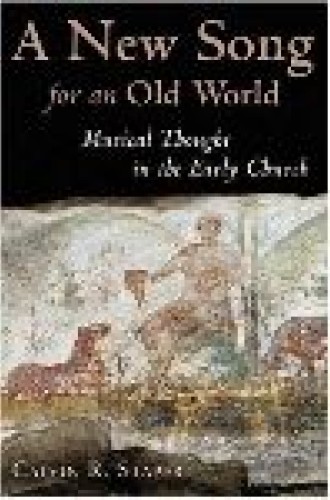A New Song for an Old World
What can the early Christians teach us about music? Calvin Stapert ponders the stance of early Christian teachers on music, paying particular attention to their injunctions on Christian song. His method is to reflect on the writings of Latin and Greek church fathers in pairs: Tertullian and Clement of Alexandria, Ambrose and John Chrysostom. He concludes with a selection of writings by Augustine of Hippo. Stapert does not simply summarize their arguments, but instead offers slabs of primary texts with a guiding commentary.
To grasp the concerns of these writers we must imagine living in the pagan culture of the Roman Empire. There was no avoiding music. It was important in imperial ceremonies, weddings, funerals, theaters and a wide variety of religious rites. In the background were exalted Pythagorean and Platonic understandings of music as cosmic order made audible. Christians knew of “ecstatic, orgiastic music of mystery religions from the East.” And on the ground Christians were surrounded by a cacophony of sound: lascivious music and dance in taverns, sensual and erotic music in theaters, blood-curdling, raucous bands in the arenas and blasts of trumpets in processions. Not only Christian leaders, but also many pagan Romans denounced these decadent excesses.
Christians forged their principles and practice of music in worship against this background—music as taught by the philosophers and music as experienced in the surrounding culture—combined with one other potent factor: Christian origins in Jewish tradition.
Stapert’s five figures vehemently rejected the music associated with public spectacles, pagan banquets and festivities. But they enthusiastically approved another kind—music that stilled the “passions.” Passions were not simply emotions or feelings. They were tendencies which made people react with fear, anxiety or false pleasure. The five figures knew that music had the power to excite unbridled responses which perturbed the soul. But they recognized that for the Christians music could calm the passions.
More than that, they believed that music could convey the truth of the faith. Christian singing expressed love and joy—true responses to God. Christians sang with understanding. For them singing was a bond of unity, and theirs joined with the song of the heavenly hosts. What did Christians sing? They sang the Hebrew Psalms and they sang new psalms of their own. John Chrysostom, for example, knew and encouraged the music that accompanied many of life’s daily activities, such as work songs and lullabies. He charged his people to sing the Psalms, even silently in their minds, as they went about their daily lives.
Stapert describes Christian attitudes toward music over three centuries. He finds a uniform polemic against the music of the late Roman Empire, but also a consistent enthusiasm for Christian psalms and hymns. He presents these insights well. But Stapert overlooks a significant factor that must have affected Christian musical expression. The status of the church altered dramatically during this period from extralegal domestic assemblies in the time of Tertullian to the favored congregations gathering in massive basilicas in cities such as John Chrysostom’s Antioch. Christian worship changed from the informality of intimate house churches sharing agape meals and care for their poor in the time of Clement of Alexandria to the awe-inspiring rites of the churches in Bishop Ambrose’s Milan.
Listen to Tertullian’s early-third-century description of free worship: “and then each, from what he knows of the Holy Scriptures or from his own heart, is called before the rest to sing to God.” Free worship, domestic and small-scale, with its homemade psalms and prayers in early-third-century Carthage gave way to the splendid clergy-led fixed liturgies, complete with long sermons and musical processions, in fourth- and fifth-century basilicas and cathedrals. While delighting as did Augustine in the sweet chants of the cathedral in Milan, I would have welcomed discussion of how this trajectory affected Christian song. What qualities of music—spontaneous, praise-filled—might have been lost in this transition? What might be some implications for Christian worship today?
What can church musicians and pastors learn about music from the early church? In his final, practical chapter Stapert calls us to take music seriously, to observe carefully how music functions in society and in the church. Not all music is good; a song is more than “just a song”; music is more than a tool or a gimmick for church growth. Christians should use music as response, not as stimulus or manipulation. Stapert calls us to follow the early Christians in making the Psalms an important part of worship and also of daily life. The “new song” is Christians’ joyful response to our gracious God, the song this old world needs to hear.




